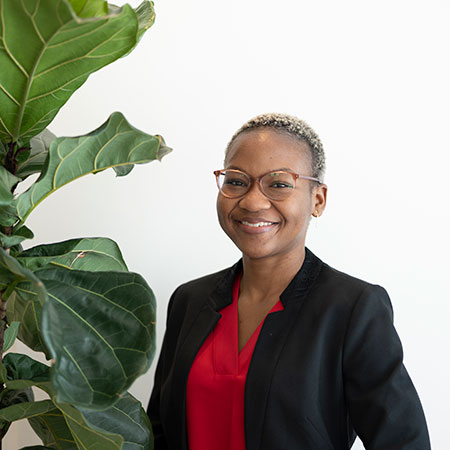In Celebration Of: International Women in Engineering Day
As we at the IEEE Power & Energy Society celebrate International Women in Engineering Day, which is celebrated annually on June 23 to honor women in the field of engineering who are changing the field one degree at a time, we would like to spotlight Larissa Affolabi, a PES graduate student member who is pursuing her Ph.D. in Electrical Engineering with a focus in Power Systems at the Illinois Institute of Technology (IIT), who became an engineer so she could pursue a career that would allow her to make a meaningful impact on society by solving real-world problems.
Growing up in Benin, West Africa, Larissa didn’t learn about engineering as a career path until an upperclassman explained to her that it was a field that uses mathematics, physics, and science. Ultimately, what drew her was her perception that the end goal of engineering was not science for the sake of itself but to solve practical problems.
Realizing she had found her niche, Larissa began pursuing her bachelor’s plus master’s degrees in a five-year program that gave her the opportunity to study in Benin, France, and the US. Upon receiving her master’s at IIT, she was invited to join a Ph.D. program where she is currently in her fourth and final year.
When asked how she found her way to power specifically, Larissa said:
“I was attracted to the power industry first because of renewable energy which, at the time, was a relatively new and futuristic concept to me, and because of my upbringing in a developing country that has power reliability issues. I realized that in the 21st century, without electricity you can do nothing – there is no prosperity or economic growth – and I wanted to be in a field where I could make a tangible difference in the lives of others.”
It was when she came to IIT that Larissa first learned about PES and IEEE and realized their global reach and the impact they would have on her career.
“I joined IEEE and PES almost at the same time at the beginning of 2019, shortly after I came to the US. IEEE made me fall in love with the power industry all over again because as an organization, it brings together the different aspects of Electrical Engineering and you see how different technologies help the power system tackle its challenges, but you also see the interdependency with other fields, such as control and communication systems, because everything is interconnected,” she explained. “PES more precisely helped me see the diversity in terms of skills needed in the power industry because originally, I thought power only involved electricity but it’s more than that. PES broadened my horizons and helped me see all the other professionals involved.”
Larissa went on to say that events such as webinars and conferences have had a big impact as well, most notably the IEEE PES GridEdge Technologies Conference and Expo that took place this past April where she won the Best Presentation Prize in her session during the PhD Dissertation challenge.
“In those events, you get to meet and interact with professionals and learn about what they are doing, the most pressing issues, and the latest advancement in the field – importantly – you get to do something besides your own work which can be truly eye-opening,” she said.
Equally important, Larissa noted, are the opportunities within IEEE and PES to mentor and be mentored.
“I don’t see myself as a role model – yet – though I aspire to become one. I hope that one day I can also give back and help people the way I have been helped,” she said. “Through the years, I’ve noticed the staggering gender gap in this industry, but I am also seeing female leaders gain more exposure, and it does provide positive encouragement because you feel like you can do it, too.”
Looking ahead, Larissa said that once she finishes her Ph.D. journey, she plans to join the industry and begin doing what she set out to do – make an impact by solving pressing, real-world problems.
“To me, academia is about solving problems that may arise in the long-term future in 10 to 15 years or more. While conducting research in academia has been a valuable experience, I feel a strong desire to shift my focus towards addressing the pressing issues at hand and exploring a different facet of the power industry beyond academia,” she said. “Looking ahead, my long-term aspiration is to actively contribute to overcoming the challenges faced by the power industry in Sub-Saharan Africa. Sub-Saharan Africa has its unique challenges and priorities that greatly differ from those in North America, notably the US. In the short term, however, I am eager to gain firsthand experience in the US as there is still so much for me to learn from the advancements and initiatives taking place here.”
As she takes a moment to reflect on how far she has come and how far women, in general, have come in the engineering field, Larissa noted that she would like to see the field continue to become less “labeled” from a gender perspective.
“Personally, I believe that we need to shift our focus towards seeing people as unique individuals rather than categorizing them,” she said. “I strive to take people as individuals and not define them with any kind of label because everyone has a unique set of skills and perspectives and something to contribute.”


